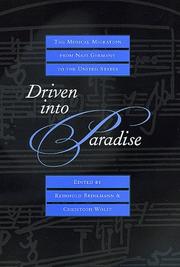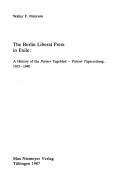| Listing 1 - 4 of 4 |
Sort by
|

ISBN: 0520214137 9780520214132 Year: 1999 Publisher: Berkeley ; Los Angeles ; London University of California Press
Abstract | Keywords | Export | Availability | Bookmark
 Loading...
Loading...Choose an application
- Reference Manager
- EndNote
- RefWorks (Direct export to RefWorks)
Music --- anno 1900-1999 --- Germany --- United States --- Austria --- National socialism and music. --- Exiles --- Musicians --- History and criticism. --- History --- Biography. --- Nationaal-socialisme en muziek --- National socialism and music --- National-socialisme et musique --- 20th century --- History and criticism --- Europe --- Biography --- Music - United States - 20th century - History and criticism. --- Exiles - Germany - History - 20th century. --- Exiles - Austria - History - 20th century. --- Musicians - Europe - Biography.

ISBN: 3484350180 3110962063 9783484350182 Year: 1987 Volume: 18 Publisher: Tübingen Niemeyer
Abstract | Keywords | Export | Availability | Bookmark
 Loading...
Loading...Choose an application
- Reference Manager
- EndNote
- RefWorks (Direct export to RefWorks)
Sociology of literature --- Journalism --- German literature --- anno 1900-1999 --- German newspapers --- Exiles --- Liberalism --- History --- Pariser Tageszeitung --- Duitse antinazistische dagbladen. --- Pariser Tageszeitung [Journal]. --- Journaux allemands antinazis. --- Pariser Tageszeitung [Dagblad]. --- Pariser Tageszeitung. --- Persons --- Aliens --- Deportees --- Refugees --- Newspapers --- Pariser Tageblatt --- German newspapers - France - Paris - History - 20th century --- Exiles - Germany - History - 20th century --- Liberalism - Germany - History - 20th century
Multi
ISSN: 03046257 ISBN: 9789042025400 9042025409 9786612594526 9042028769 1441606548 1282594524 9781441606549 9789042028760 9781282594524 6612594527 Year: 2009 Volume: 68 Publisher: Amsterdam Rodopi
Abstract | Keywords | Export | Availability | Bookmark
 Loading...
Loading...Choose an application
- Reference Manager
- EndNote
- RefWorks (Direct export to RefWorks)
This volume presents for the first time a study of the interface between exile and travel within the context of exile from Nazi Germany. The nineteen essays share the overarching aim to compare the tropes of travel and exile as generators of a critical discourse and as central categories within German exile, in particular literature, music and film. The essays are guided by powerful questions: How does travel compare to exile, and how much overlap is there between these two categories? How do exiles travel, as practitioners of displacement? Or rather, to what extent does the concept of travel apply to the exilic predicament? Do the terms “exile” and “travel” still have validity in our postmodern era of cosmopolitanism, ever increasing mobility, the embrace of otherness, and tourism? How does exile literature in which travel is thematized compare to the tradition(s) of travel writing? And how are the critical moments of leavetaking, re-membering home, and return imagined and narrated? The essays feature numerous German and Austrian authors, musicians, and filmmakers and lend fresh insights into German Exile and the field of Exile Studies at large.
Exiles --- Exiles in art --- Exiles in literature --- Exiles' writings, German --- Travel writing --- History --- Germany --- Exiles in art. --- Exiles in literature. --- Exiles' writings, German. --- Travel writing. --- Travel. --- German literature --- Thematology --- Art --- anno 1940-1949 --- anno 1930-1939 --- German exiles' writings --- Authorship --- Travel --- Persons --- Third Reich, 1933-1945 --- Exiles - Germany - History - 20th century --- Germany - History - 1933-1945
Book
ISBN: 9781571135902 1571135901 9781782043270 1782043276 Year: 2014 Publisher: Rochester, New York Camden House
Abstract | Keywords | Export | Availability | Bookmark
 Loading...
Loading...Choose an application
- Reference Manager
- EndNote
- RefWorks (Direct export to RefWorks)
Captures the learning process of Nazi-era literary exiles following in the footsteps of legendary literary exemplars of exile. Exile is as old as humanity itself but a radically new fate for the "novice" exile, who falls into a world about which personal experience can tell him nothing. He does, however, know a great number of stories -- myths, legends, allegories, biblical or historical accounts -- about exile. The novice's search for a foothold initiates a learning process in which the exilic tradition assumes a major role. The present book captures this learning process:it is a cultural history of exile as it was experienced by thousands of German and Austrian writers and intellectuals who opposed National Socialism: among them Brecht, Canetti, Seghers, Remarque, the Manns, and Ludwig Marcuse. It shows how, slowly, exile becomes a reality through the growing awareness of -- and reference to -- the exemplary figures of a shared fate. Scores of fellow travelers, from the mythic figures Odysseus and Ahasverus ("The EternalJew") to writers such as Heinrich Heine and Victor Hugo, frame the experience of exile, imbuing it with meaning, giving it depth, and even elevating it to a "High Moral Office." They frequently make appearances in the narratives of the Nazi-era exiles. The Russian-American exile poet Joseph Brodsky called writers in exile "retrospective and retroactive beings." What their retrospective gazes yield as they search for meaning in banishment is at the heart ofthis book.. Johannes F. Evelein is Professor of Language and Culture Studies at Trinity College, Hartford, Connecticut.
Exiles' writings, German --- Exiles' writings, Austrian --- Exiles --- Exiles in literature --- History and criticism --- History --- Exiles' writings, German - History and criticism --- Exiles' writings, Austrian - History and criticism --- Exiles - Germany - History - 20th century --- Exiles in literature. --- History and criticism. --- Ahasverus. --- Heinrich Heine. --- Nazi-era literary exiles. --- Odysseus. --- Victor Hugo. --- exemplars of exile. --- exile tradition. --- literary testimony. --- retrospective gazes.
| Listing 1 - 4 of 4 |
Sort by
|

 Search
Search Feedback
Feedback About UniCat
About UniCat  Help
Help News
News